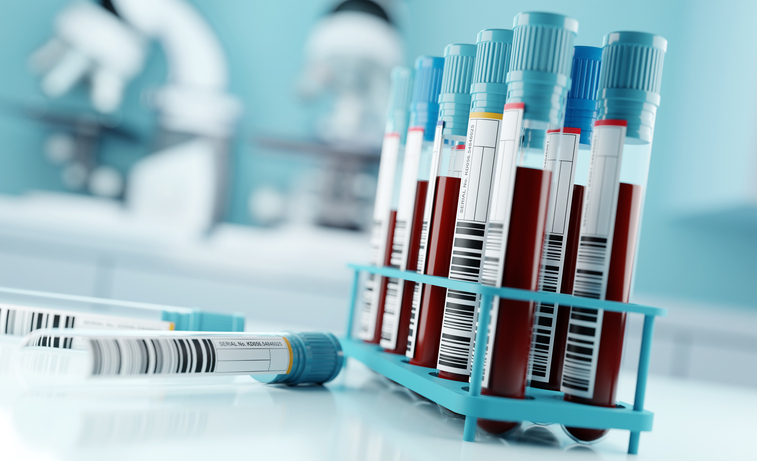
A New Way to See What Scans Can’t
For decades, CT scans and MRIs have been the standard tools for diagnosing mesothelioma. But a new discovery is shifting the landscape. A mesothelioma blood test is now showing signs of being able to detect cancer that imaging misses, and it may help doctors treat this aggressive disease earlier and more precisely.
The test works by identifying circulating tumor DNA, or ctDNA, fragments shed by mesothelioma cells into the bloodstream. Because mesothelioma often spreads in thin layers along the pleura (the lining of the lungs), rather than forming a single mass, it can be difficult for imaging to pick up the full extent of the disease. In these cases, cancer activity may go unnoticed. This blood test changes that by detecting tumor DNA even when scans appear normal.
Understanding How the Blood Test Works
Circulating tumor DNA is a molecular fingerprint left behind by cancer cells. These fragments can be found in the blood and analyzed using advanced sequencing techniques. When present, ctDNA offers a clear signal that cancer is active in the body, even if no tumors are visible through traditional imaging.
The real breakthrough lies in how this test can be used alongside treatment. Doctors have begun to monitor ctDNA levels before, during, and after therapy. If levels drop during treatment, it’s a sign that the approach is working. If levels rise again post-treatment, it may suggest the cancer has returned before symptoms or imaging can confirm it.
This allows for earlier intervention, more personalized therapy choices, and better planning for surgery or immunotherapy. Instead of relying solely on imaging, oncologists can now use ctDNA results to see a more complete picture of the disease.
Immunotherapy and Surgery: A Coordinated Strategy
In addition to detection, the mesothelioma blood test is helping improve treatment strategies. In patients with resectable pleural mesothelioma, meaning the cancer can be surgically removed , a new approach is gaining attention. It combines immunotherapy with surgery and uses the blood test to guide timing and assess response.
Some patients receive immunotherapy before surgery to weaken or shrink the disease. After surgery, treatment continues with more immunotherapy to prevent recurrence. Throughout the process, the mesothelioma blood test helps track the cancer’s response in real time.
If ctDNA levels fall, that typically signals a good response. If they remain unchanged or increase, doctors may reconsider the treatment plan. This flexible, patient-centered model reflects the future of mesothelioma care , one where data guides decisions every step of the way.
Why Earlier Detection Matters
Mesothelioma is difficult to diagnose early. By the time symptoms appear , such as chest pain, fluid buildup, or shortness of breath, the cancer has often progressed. Traditional scans can sometimes miss small or diffuse cancer cells, allowing the disease to grow unnoticed.
The mesothelioma blood test addresses this problem head-on. It enables doctors to detect cancer activity at the molecular level, often before visible signs appear. This earlier window allows for faster decisions, more aggressive interventions, and a better chance of long-term survival.
Beyond initial diagnosis, the test also supports continuous monitoring. For patients in remission or undergoing maintenance therapy, the ability to track ctDNA offers peace of mind and an early warning system. If ctDNA is no longer detectable, it suggests the treatment is working. If it returns, doctors can act swiftly before the cancer advances further.
What This Means for Patients and Families
For anyone facing a mesothelioma diagnosis, this new testing method opens a door to better outcomes. It brings clarity in uncertain moments, like when imaging results are inconclusive or when determining whether surgery is the right path.
Families can feel more confident knowing there’s another layer of insight guiding the treatment plan. Patients can engage more actively in their care by asking the right questions: Is ctDNA testing right for me? Will it help guide decisions about surgery or immunotherapy? Can it help catch recurrence earlier?
In many cases, the answer is yes. While the test is still undergoing broader clinical evaluation, its potential is already changing how some physicians treat pleural mesothelioma, offering a smarter, more proactive approach to care.
A Glimpse Into the Future of Mesothelioma Care
Although not yet a universal standard, the mesothelioma blood test reflects a growing movement toward precision medicine. Future cancer care will likely rely less on imaging alone and more on molecular data that captures the hidden behavior of tumors.
As larger clinical trials confirm the effectiveness of this test, it may become widely available across treatment centers in the U.S. Its ability to detect mesothelioma early, monitor its response to treatment, and guide long-term management gives it a strong case for adoption.
Eventually, mesothelioma care could become more responsive, more customized, and more hopeful, giving patients the right treatment at the right time
Frequently Asked Questions
How is a mesothelioma blood test different from standard lab work?
This test doesn’t just check for general markers. It looks for small fragments of tumor DNA in the bloodstream, offering a clearer sign of active disease.
Can this test replace CT scans or MRIs?
Not entirely. It works best when used alongside imaging, offering added insight when scans are unclear or incomplete.
Is the test available to all patients?
At the moment, it is primarily available in research or specialty cancer centers. Wider use may come after further clinical trials.
Will insurance cover it?
Coverage varies. Patients should consult their care team and insurance provider to understand what’s available in their area.
Does the test work for all mesothelioma types?
It’s most promising in diffuse pleural mesothelioma, where imaging is often limited. Additional studies are needed for other types.
What questions should I ask my doctor about this test?
Ask whether ctDNA testing is appropriate for your case, how it might influence your treatment plan, and whether it’s part of any clinical trials near you.
